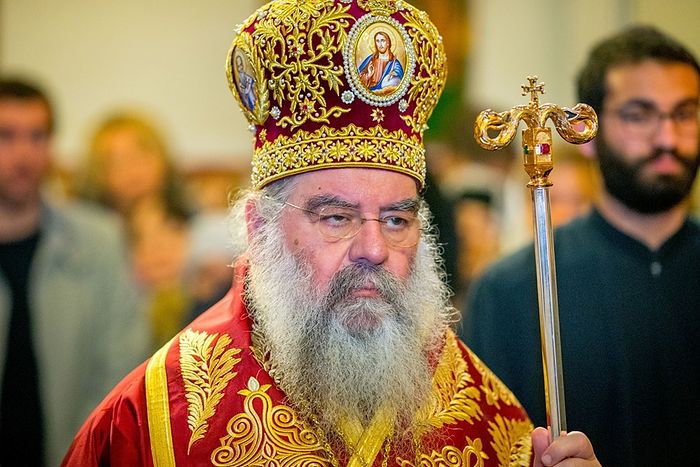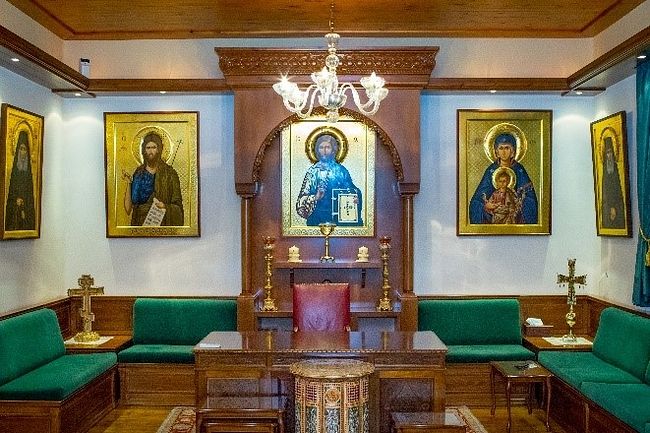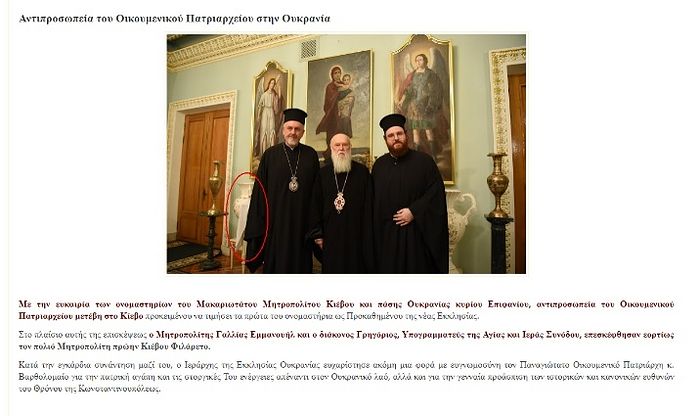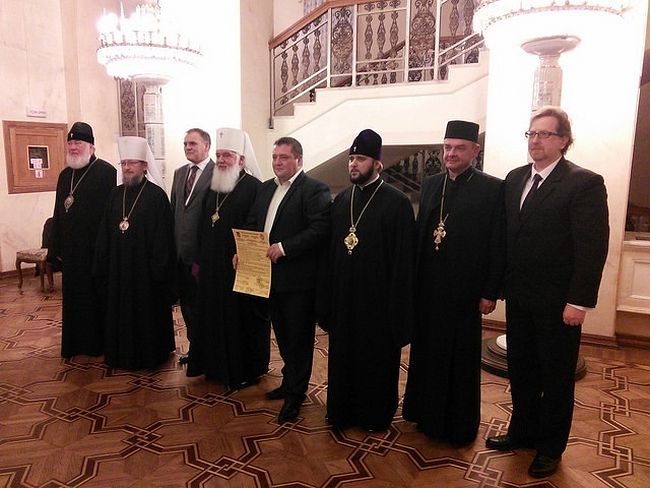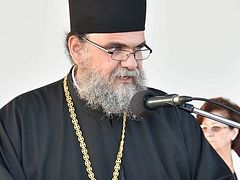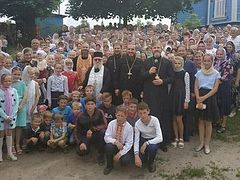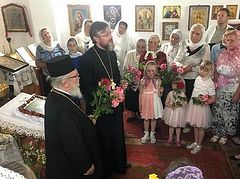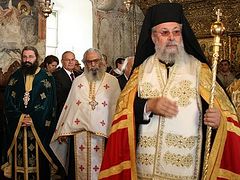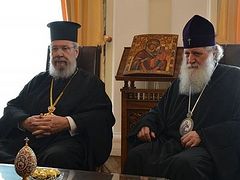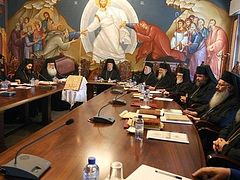His Eminence Metropolitan Athanasius of Limassol is someone who doesn’t need to be introduced in the Orthodox world. He enjoys authority by virtue of his high spiritual life and is known as a man of prayer and strict defender of Orthodoxy. That is why it was important for us to find out his personal view regarding the situation in Ukraine.
Entering the room in which the interview was to take place, our eyes landed on the many images of ascetics, saints, and Cypriot hierarchs. All four corners of the room had crosses. All of this created a certain atmosphere, where the spiritual becomes central. “Are we going to do the entire interview about Ukraine?” Vladyka asked.
—Good afternoon, Vladyka. I am grateful to you for the opportunity to conduct today’s interview. Indeed, the situation in Ukraine has become perhaps the most discussed topic in the entire Orthodox world, therefore we wanted to talk precisely about that. Cyprus was one of the first countries to accept Christianity, and the Cypriot Church has a rich history and great experience in the Christian life. Therefore, the proposal of the Cypriot Church to create a platform for inter-Orthodox negotiations here in Cyprus is quite natural, and we see that it has already brought its first fruits—the Jerusalem and Antiochian Churches are ready for dialogue and intend to overcome the crisis in their relations. Does the Cypriot Church have a vision for how to get out of the crisis that has developed in the ecclesiastical sphere in Ukraine?
—As you know, the Archbishop of Cyprus already visited the Patriarchate of Bulgaria, the Patriarchate of Serbia, and the Church of Greece, and met with the Patriarchs of the Alexandrian, Antiochian, and Jerusalem Churches, and he maintains communication with Archbishop Anastasios of the Albanian Church. He’s doing everything possible to overcome this crisis. I don’t know if they’ve already managed to achieve any results, but the Archbishop and the Synod of our Church are making every effort to help resolve this crisis.
—Before the granting of the tomos of autocephaly for the Ukrainian Church, the president of Ukraine Petro Poroshenko and Patriarch Bartholomew signed an agreement, according to which the Patriarchate of Constantinople committed to work with other Local Churches for the recognition of Ukrainian autocephaly, and Petro Poroshenko was supposed to transfer property and buildings in Ukraine to the possession of Patriarch Bartholomew. It looks like a contract for the sale of autocephaly and it sowed temptation and indignation among the people.
How should the procedure for the granting of autocephaly take place, and how appropriate is such a deal from the point of view of Church traditions?
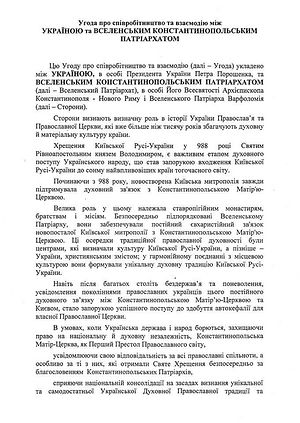 —As for the first part of your question about the agreement you mentioned, I have no information about it, so I can’t comment about it at all. Perhaps it’s because I don’t know the language. As for the second part of your question about the procedure for granting autocephaly, as far as I know, during the meetings preceding the Council of Orthodox Churches (on Crete), there were many conversations on this topic of how autocephaly should be granted to a Church. I was never at these meetings, but as far as I know, all the Churches went to the last stage of discussing this issue, but did not find a common solution.
—As for the first part of your question about the agreement you mentioned, I have no information about it, so I can’t comment about it at all. Perhaps it’s because I don’t know the language. As for the second part of your question about the procedure for granting autocephaly, as far as I know, during the meetings preceding the Council of Orthodox Churches (on Crete), there were many conversations on this topic of how autocephaly should be granted to a Church. I was never at these meetings, but as far as I know, all the Churches went to the last stage of discussing this issue, but did not find a common solution.
Considering all these issues, it should be understood that every decision of the Church should lead to unity and love. I don’t want to believe that the Ecumenical Patriarch, or the Church of Ukraine, or the Russian Church wanted to create a problem, but a problem truly exists now, and therefore we should all find a way to solve this problem together, find a path for healing this wound. On this path, the heads of the Church must be very attentive, proceed from the common interests of the Church, and show humility. All this should be inherent in the primates of the Churches, the clergy, and all Christians.
—There are about 100 bishops in the Ukrainian Church under the leadership of Metropolitan Onuphry. Only two bishops of the UOC joined the new church structure in Ukraine. Given the lack of desire of the hierarchs of the canonical Church to go to the new structure in Ukraine, people are inclined to think that the tomos was given to the schismatic structures (UOC-KP and the UAOC), thereby legalizing schism. What is the attitude to this in the Local Orthodox Churches?
—I’ll read you a passage from the sixth point of the statement of the Holy Synod of the Cypriot Orthodox Church, where it is specified that the Holy Synod hesitates to recognize the priesthood of people who did not receive canonical ordinations. The sixth point says: “The 2,000-year history of the Church of Cyprus, and the entire Orthodox Church, casts doubt upon the possibility of legalizing the sacraments performed by hierarchs who were defrocked and who were excommunicated from the Church and anathematized.”
Their punishment was recognized by all Orthodox Churches. We recognized the laying of the anathema upon Philaret, and therefore the Synod of the Cypriot Church doubts that it’s possible to recognize the efficacy of the consecrations and other sacraments celebrated by them. Therefore we—the Church of Cyprus—have as yet not officially recognized Epiphany as the head of the new Ukrainian church.
—It was reported in the media that you did not sign the communiqué of the Cypriot Church about the situation in Ukraine. What was the reason?
—It’s true. I did not sign the statement of Synod of the Cypriot Church because I did not agree with some spots in the text. Of course, the majority of the members of the Synod adopted this text, and it became a reflection of the position of the Church of Cyprus. This text was aimed at maintaining order in the Church, but I personally have some doubts about certain spots in this text.
—Several representatives of the new Ukrainian church under the leadership of Epiphany Dumenko interpreted your decision as you allegedly wanting to support them.
—[Laughs] Exactly the opposite. I wanted the text to be clearer and more precise and express support for Metropolitan Onuphry and some other points. Of course, I respectfully accept the opinion of the Archbishop and other members of the Synod about how we should have a neutral position for the sake of the possibility of becoming mediators between Constantinople and Moscow. From this point of view, it is acceptable for me to some extent, but I would prefer that the Synod of the Cypriot Church express a clear and unambiguous position, since anyone can interpret this text published by the Cypriot Church according to his own judgment: whether “for” or “against.”
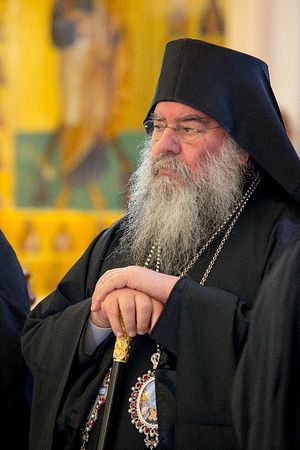 And so, that is what happening. I’ll give you an example to better understand. The first paragraph says that every nation has the right to also claim Church autocephaly along with receiving national independence. If we take this as a rule, then every country will create its autocephalous Church. I’ll give you one simple example: The Antiochian Patriarchate spiritually nourishes several countries: the Arab Emirates, Lebanon, Syria, and others. According to this logic, Lebanon should have autocephaly, and other countries would also receive Church autocephaly.
And so, that is what happening. I’ll give you an example to better understand. The first paragraph says that every nation has the right to also claim Church autocephaly along with receiving national independence. If we take this as a rule, then every country will create its autocephalous Church. I’ll give you one simple example: The Antiochian Patriarchate spiritually nourishes several countries: the Arab Emirates, Lebanon, Syria, and others. According to this logic, Lebanon should have autocephaly, and other countries would also receive Church autocephaly.
It’s the same with the Alexandrian Patriarchate: There are many African countries under its leadership. According to this logic, Kenya should be autocephalous, and Mozambique, and Tanzania. These are all separate countries and separate nationalities. If we apply this logic to everyone, it would be a mosaic of autocephaly. It’s not logical. When we do something, we should think first of all about the consequences, recognizing the strengths and weaknesses of each individual Church. Do we really not see that our Russian brothers relate to Kiev as to the baptismal font of Rus’?
—And of course, this logic also leads to the idea that with the termination of the existence of some separate state, the relevant Church should liquidate itself.
—That too, and I’ll give you an example: Skopje, or North Macedonia as it is now called, which we do not recognize. By this logic, they should have an autocephalous Church; and Montenegro too. Do you understand that this is a path to catastrophe with a great many problems? That is why the text of the statement was unacceptable for me personally. I respect the decision of the Church, I fulfill obedience to the Church, but expressing my personal opinion on this matter, I can say that I do not agree.
—Patriarch Bartholomew said that the provision of the tomos of autocephaly was aimed at healing the divisions in Ukraine. However, Metropolitan Anthony of Boryspil recently stated that less than one percent of parishes from the canonical Church under Met. Onuphry left for the new church. And in one of his interviews a few days ago, Philaret Denisenko said that the tomos led to division and opposition even among the ranks of those who it is accepted to call schismatics in Ukraine. It turns out that the tomos doesn’t unite, but yet further divides Ukrainian society. Perhaps the issuing of the tomos without taking into account the opinion of the UOC and the Local Churches was a mistake?
—In my personal opinion, it was a somewhat hasty decision. It was necessary to wait until the primates of all the other Local Churches also expressed their consent. Now we see that the Synods of the Local Churches are being called upon (by Constantinople) to recognize the new church structure post factum, which creates many problems.
In the case of Ukraine, there are a number of questions:
- excommunicated, anathematized, defrocked, like Philaret;
- the “priests” of Makary having no valid ordination;
- and also that a hierarchy already existed—100 hierarchs with their canonical primate Metropolitan Onuphry, with whom we all have concelebrated, according to the canons.
And all of this capsized in one day. Of course, it was not the decision of one man, it’s not the decision of Patriarch Bartholomew—it’s the decision of the Synod of the Patriarchate of Constantinople under the chairmanship of Patriarch Bartholomew.
—Many Churches are now raising questions about how the consecrations in the newly-created structure are invalid. The representatives of several Churches have explicitly said that it’s a gathering of laymen, as there can be no priesthood among schismatics.
—The Synod of the Cypriot Church says this: There can be no priesthood among those who were deprived of the priesthood, were excommunicated, or were subject to anathema.
—At the same time the representatives of the Patriarchate of Constantinople declare that this new structure still has a full priesthood. The first canon of St. Basil the Great explicitly says that everyone who goes into schism immediately loses apostolic succession and the priesthood and can no longer celebrate the Sacraments or pass on the grace of the priesthood, inasmuch as they themselves have fallen away from the grace of the Holy Spirit and are laymen.
Does the position of the Patriarchate of Constantinople mean that its attitude to this canon of an Ecumenical Council has been revised and that there are paths to directly opposite conclusions than those spoken of there?
—If the sacred canons say it, no one can question it, but they must accept it. In the case with Ukraine, several people did not receive the episcopal dignity—the group of merely so-called bishops who ordained themselves—Makary’s “bishops.” There was Philaret, and there was a group of people under Makary, who are in fact self-consecrated—they were not ordained. If there was only one group that had been defrocked, but previously had ordinations from canonical bishops, the Synod could have received them as ordained by economia. Naturally, this could be in the case that they repented of their sin before this and asked forgiveness from the Church. Unfortunately, this is not what we see, and we do not see that they were given some kind of legitimate ordination now.
—The representatives of the new church are creating problems for the canonical Church now. Should the Patriarch of Constantinople, having, according to the tomos, the appropriate authority in the new church, make statements and influence these people who don’t even hide their struggle for power? Should Patriarch Bartholomew put an end to this?
—I can’t know what the Ecumenical Patriarch thinks about. It’s not easy for us to talk about Patriarch Bartholomew, because he is our father, and we respect and love him. At the same time, we consider Metropolitan Onuphry our brother. We don’t make a division between the Ukrainians and the Greeks—for us they are brothers and Orthodox Christians. And you have to understand that what is happening now is painful for us—we are pained about one Patriarchate and the other, and for the Church of Ukraine.
—There is the view that attempts to declare the actions of the schismatics to be blessed Sacraments and to recognize their consecrations will lead to a blurring of the concepts of good and evil over time. It turns out that only yesterday the Church recognized something as a sin (for example, when Patriarch Bartholomew recognized the correctness of the anathema against Philaret in a letter to the ROC), and today it turns out that sin has stopped being a sin. Behind the attempt to reexamine this structure’s past, not only the questions of its status and the territorial boundaries of the canonical Church are examined, but also the questions of sin and virtue. The concepts of good and evil would be erased in the Church: With the stroke of a pen, yesterday’s sinners can be declared pious priests, and pious priests—sinners. What do you think about this?
—Look. Every sin and every bad action is forgiven through repentance. If there is repentance, the Church receives everyone. No one is excluded from this. There are examples in the history of the Church when our Church, for the purposes of economia, received communities of schismatics into its embrace by Synodal decision. However, this should be preceded by repentance and a recognition of sin. Then the Church, as a loving mother, embraces all of its children. But unfortunately, we do not see this in the case with Philaret.
—Metropolitan Emmanuel from the Patriarchate of Constantinople recently visited Ukraine and, among other things, met with Philaret Denisenko. Joint photos were taken after the meeting where Denisenko’s patriarchal kukol (domed hat) was lying in the background. These photographs were published on the Phanar’s official site. In his speeches, Denisenko points out that since Patriarch Bartholomew already recognized the new church, then he will make any concessions, even if they break the conditions of the tomos, not to lose authority in the eyes of the other Churches. If Denisenko would be recognized by Patriarch Bartholomew as a patriarch, how would this be treated in the Orthodox world?
—I think that isn’t serious, because Denisenko is a rather elderly, and we shouldn’t concentrate our attention on one specific person. At some point he will leave this world, like all of us. The important question is who is the canonical, legitimate head of the Church of Ukraine, who can we celebrate the services with, and who not. The problem is not in some particular person—Philaret, Epiphany, or anyone else. It is a question of the sacred canons, which serve as the guarantor of order in the Church.
—Philaret Denisenko and Makary Maletich—the former heads of the schismatic structures the UOC-KP and the UAOC—publicly declared that despite the creation of the new church, they still haven’t submitted the documents to liquidate their structures, and so far they don’t intend to. Moreover, even the official sites of these schism still function under their old names, and on the site of the UOC-KP Philaret Denisenko is still called patriarch and head of this structure. That means that one and the same people are at the same time members of the new church, and of schisms.
—Of course, all of this is part of the sad reality connected with the Ukrainian Church. Perhaps they themselves will say that they need time to get everything in order, but I repeat what I said earlier—the main question is not in the details of their actions, but in what canonical path they should have walked.
—“Metropolitan” Joasaph of Belgorod, a cleric of the newly-created church, recently said that there is a great confrontation between Philaret Denisenko and the head of the new church Epiphany, and also between their adherents, and this situation could give rise to a schism in the structure.[1] If the situation worsens, should the Patriarchate of Constantinople give an account for everything that has happened on its initiative, and is there really a threat of schism in world Orthodoxy due to the granting of a tomos of autocephaly to the new church in Ukraine?
—I don’t think the problem concentrates on one person, even if that person is Denisenko. Regarding the possibility of greater problems arising in the Orthodox Church—unfortunately, there is such a danger. But we hope first of all in the mercy of God Who does not permit any temptations exceeding the strength of His Church, and in the consent and good intentions of the heads of all the Local Churches: Ecumenical Patriarch Bartholomew, Patriarch Kirill of Moscow, and Metropolitan Onuphry of Kiev, because they all want something good for the Church. I think they all have good intentions. I believe the Lord will send a resolution to the problem and therefore we should pray a lot. Christ said that temptations are overcome by great faith and numerous prayers.
—According to the canons, every city can have only one Orthodox bishop. When Patriarch Bartholomew says that Epiphany is now the metropolitan of Kiev, does that not mean he is declaring Metropolitan Onuphry almost a schismatic who has no right to be a hierarch of Kiev?
—No, he didn’t say that. We have to be truthful. He wrote in his letter: “When a new Metropolitan of Kiev will be elected after the tomos, then Onuphry will not be able to be called the Metropolitan of Kiev,” but he did not say he will become a schismatic. I have already said that, unfortunately, these are the consequences of a hasty decision.
—Is Metropolitan Onuphry therefore deprived of the possibility of serving in Ukraine?
—I don’t think so. Perhaps in Constantinople they thought that everyone would want to enter the new church, and that dictated such a decision, but I can’t say in their place what they think about it.
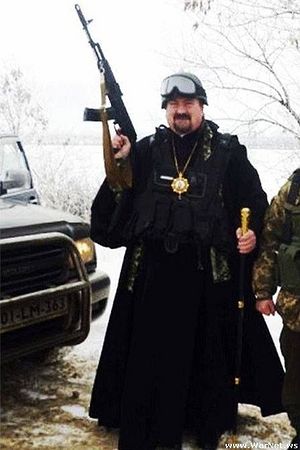 —The granting of the tomos to the Ukrainian schismatics has given birth to serious problems. For example, in 2014, the schismatic “bishop” of the UOC-KP Kirill deliberately went to the war zone to take help to the soldiers and to shoot at the separatists, and after that he showed photos of himself, weapon in hand. In an interview he stated that he fired at the separatists, although he wasn’t sure if he killed anyone. He was suspended from serving in the so-called Kiev Patriarchate, but went into schism in the UAOC, which received him as a bishop. Now the OCU has received the tomos, and this man is counted among the bishops there.
—The granting of the tomos to the Ukrainian schismatics has given birth to serious problems. For example, in 2014, the schismatic “bishop” of the UOC-KP Kirill deliberately went to the war zone to take help to the soldiers and to shoot at the separatists, and after that he showed photos of himself, weapon in hand. In an interview he stated that he fired at the separatists, although he wasn’t sure if he killed anyone. He was suspended from serving in the so-called Kiev Patriarchate, but went into schism in the UAOC, which received him as a bishop. Now the OCU has received the tomos, and this man is counted among the bishops there.
—The problem isn’t in certain individuals who behave incorrectly. People who behave incorrectly could be anywhere. Our task is to follow the sacred canons and appropriate actions, but people who do bad deeds are everywhere.
—I would like to ask this last question about the situation in Ukraine with the Catholics: It is known that all the participants in the autocephaly movement in Ukraine have agreed to rapprochement with the Uniates in one way or another. I am studying the role of the Catholic church in the protest movements and state revolutions during the reign of Pope Francis of Rome, so I know many facts about how it was the Uniates who often promoted ideas of autocephaly for the Orthodox in Ukraine.
The new church essentially consists of three parts:
1) The schismatics of the former, so-called Kiev Patriarchate
2) Those who were subject to Makary
3) Two bishops who left the canonical Church
If we look at the first group, Philaret Denisenko announced the possibility of uniting with the Uniates in 2014 and 2016.
If we look at the second group, Makary Maletich signed a memorandum with four bishops from other churches in 2014, including Uniate bishops, on the establishment of one church on the level of individually drawn dioceses. Two bishops from the canonical Church also signed, without Metropolitan Onuphry’s knowledge, and a few days later they withdrew their signatures. But it showed Makary’s readiness to create one church with the Uniates without the Uniates renouncing their errors.
If we draw our attention to the third group, the supporters of former Metropolitan Alexander Drabinko have called for common prayer with the Catholics.
And now the head of this structure Epiphany reports that the entire new church could unite with the Uniates in the future. Why raise the question of the status of this structure, if there are statements at every level about a possible unification with the Uniates?
—Presumably they said this before they received the tomos?
—The majority, yes, although the head of the new structure Epiphany made this statement only a few weeks ago.
—If they are making statements about things that are un-Orthodox in their essence, then the primates of all the Orthodox Churches should take this seriously into account and show them the fallacy of such statements.
Listen, as an epilogue to everything we have discussed here, I’ll tell you my personal opinion. I feel and believe it … but I could be wrong.
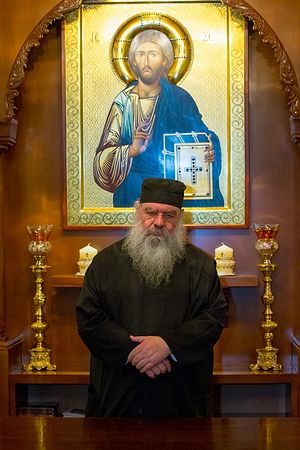 I believe that Metropolitan Onuphry of Kiev is the canonical primate of the Ukrainian Orthodox Church. I want to ask all Orthodox brothers in Ukraine to be under the omophorion of Metropolitan Onuphry, to support his Church, to remain faithful to the Orthodox faith. I understand that they’re going through great temptations. We are very sorry, and we ask forgiveness that every one of us is to some degree a cause of these temptations, but we pray that the Lord would help them pass through these temptations.
I believe that Metropolitan Onuphry of Kiev is the canonical primate of the Ukrainian Orthodox Church. I want to ask all Orthodox brothers in Ukraine to be under the omophorion of Metropolitan Onuphry, to support his Church, to remain faithful to the Orthodox faith. I understand that they’re going through great temptations. We are very sorry, and we ask forgiveness that every one of us is to some degree a cause of these temptations, but we pray that the Lord would help them pass through these temptations.
I can also say the following. I’m very impressed, and I very much admire how Metropolitan Onuphry of Kiev has handled this crisis: with great calmness, with great dignity, with few words, with few statements, and with many prayers. We don’t want to blame anyone. We respect and love our Ecumenical Patriarchate. We don’t want to upset Patriarch Bartholomew. We also respect and love Patriarch Kirill of Moscow. We are all brothers, we are all one body, Orthodox Christians. It’s a temptation. We need to lift up prayers and it will pass. That is the essence of this issue. We won’t be victorious if we shoot one another. We will be victorious if we elevate prayers in humility and ask God to carry out His holy will.
—That is, that the solution to this problem would be in a spirit of love.
—Exactly. Every day we say to Christ: “Thy will be done.” We must seek it and it should be the purpose of our life. And this approach should be seen on the level of the primates of the Churches all the moreso.

